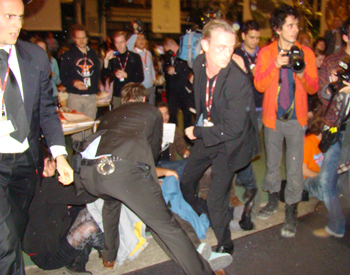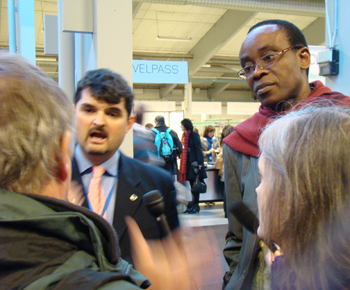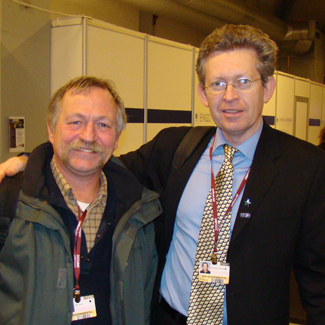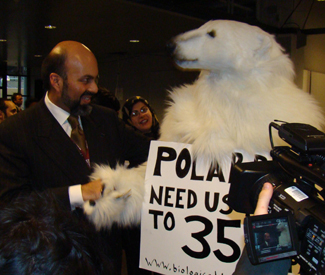|
||||||||||
|
LAST DAY AT THE BELLA
Our day starts long before the late winter dawn here in Copenhagen, and as we walk through the cold, wet streets, the sounds of police sirens and helicopters seem once again all around us. At the Bella Center the Danish Police have closed off the subway stop, for “crowd control” purposes, so along with hundreds of others we disembark at the next station and walk the rest of the way. We arrive before the doors open at 8:00 a.m. and join an enormous line, which moves faster than yesterday, thankfully, and we’re inside within half an hour. Ostensibly due to registration exceeding the 15,000-person capacity of the Bella Center, the UNFCCC Secretariat has put in place unprecedented limitations on NGO (non-governmental organizations, including conservation groups) participation. Starting yesterday, only 7,000 NGO members were allowed to enter the building, resulting in the lockout of two-thirds of the attendees. With the new restrictions, there are dramatically fewer people than last week, raising questions about whether the massive conference center is truly at capacity. As soon as we enter the building, we learn that in addition to the across-the-board restrictions, some NGOs, including Friends of the Earth, Tck Tck Tck, Avaaz, World Vision, and Via Campesina, have now been banned entirely from the conference with no explanation. As we head toward the UNFCCC Secretariat offices to find out more and protest, we encounter security personnel ejecting Nnimmo Bassey, the renowned Nigerian environmentalist and chair of Friends of the Earth International, from the conference. Amy Goodman interviews Bassey for Democracy Now! as Brendan and I and others stand by in support. Jose Bove, a French member of the European Parliament, attempts to intervene, and sits down in protest when security attempts to eject him as well. Dozens of Friends of the Earth staff stage a spontaneous sit-in outside the security checkpoint. As the 500 groups of Climate Action Network-International would write in a letter of protest later in the morning, the arbitrary exclusion of these important organizations violates United Nations principles and procedures that ensure the participation of groups like ours at the climate negotiations. Meanwhile the negotiations themselves are in disarray. There has been virtually no movement at all on the defining issue of the conference: the emissions reductions themselves. Without an agreement that provides the deep and rapid greenhouse gas reductions scientists say are necessary, the most vulnerable nations, including Tuvalu, the Maldives, and many other island states,will quite literally simply cease to exist. They have therefore proposed science-based emissions reduction targets and have refused to back down in the face of enormous pressure and intimidation from the United States and other rich countries. On Monday President Nasheed of the Maldives gave one of the most inspiring, principled speeches I have ever heard. President Nasheed pledged to make the Maldives climate neutral within a decade (e.g., 100-percent emissions reductions by 2020). Nasheed has argued for the world to adopt a carbon dioxide target of 350 parts per million. In contrast, President Obama has pledged to reduce emissions less than 4 percent below 1990 levels by 2020, which is little better than doing nothing. Obama’s proposals, when combined with other countries’ proposals currently on the table, would allow CO2 concentrations to increase to more than 770 ppm by the end of this century. While President Nasheed has proposed a plan that would actually solve the climate crisis, President Obama is advancing a plan that would condemn the Maldives and other island nations to oblivion, wipe out coral reefs and polar bears, and unleash untold human suffering on the planet. And yet despite the fact that the small island nations are the only ones proposing an agreement based on science and justice, they’re being set up in the media as the spoilers of the conference. It is not unreasonable for nations that did not cause the problem, but stand to lose everything because of it, to demand that the richest countries in the world do what is clearly scientifically necessary to solve it. That’s simply the right thing to do. Next post – A Very Bad Deal So Far |
| Polar bears on Hudson Bay © Brendan Cummings | HOME / DONATE NOW / SIGN UP FOR E-NETWORK / CONTACT US / PHOTO USE / PRIVACY POLICY / E-MAIL THIS PAGE |








